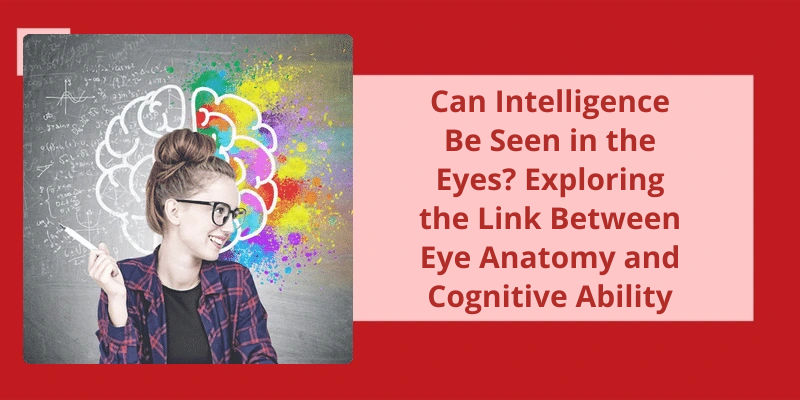The human eye is often referred to as the window to the soul and it’s no secret that they hold a remarkable amount of information about a person. But can intelligence truly be seen in the eyes? This question has intrigued researches for years and recent studies have suggested that there might be a correlation between pupil size and cognitive abilities. The theory proposed is that the larger the pupils, the higher the intelligence, as measured by tests of reasoning, attention and memory. But is this really a reliable indicator of someone's intellectual capacity? In this article, we will delve deeper into this fascinating subject and explore the science behind it.
Do Intelligent People Have Brighter Eyes?
Research suggests that eye color may be associated with certain personality traits, but there’s no evidence to suggest that intelligence is linked to eye color or brightness. However, intelligence has been linked to the ability to maintain eye contact and to focus on other people during conversations. This suggests that intelligent people may have more intense and active eyes compared to individuals with lower intelligence.
One theory suggests that people with high intelligence are more likely to have better cognitive control of their attention, which can influence their eye movements and gaze. This means that they’re better at focusing on specific objects or people and can maintain eye contact for longer durations. Eye contact is a critical communicative behavior that underpins social interaction, interpersonal relationships, and cognitive processing of emotions.
Furthermore, intelligence has been linked to curiosity and a hunger for learning. Curious individuals tend to have an active and engaged focus on the world around them, and they’re highly attuned to their surroundings. This engagement can manifest in the eyes as a bright and intense gaze. People with high intelligence are typically curious and open-minded, which means that they’re more likely to have a more attentive and interested gaze compared to people with lower intelligence.
It’s important to note that eye color or brightness is primarily determined by the amount and distribution of melanin in the iris. Melanin is a pigment that gives color to the skin, hair, and eyes. While there’s some evidence to suggest that certain personality traits may be associated with specific eye colors, such as blue eyes being linked to anxiety or green eyes being linked to creativity, these findings aren’t conclusive.
Interestingly, the perception of intelligence based on facial features seems to be gender-biased. While men’s intelligence can be accurately assessed by their appearance, intelligence in women can’t be judged in the same way. Let’s explore this further and understand the reasons behind it.
Do Intelligent People Look Intelligent?
This suggests that there may be a societal bias towards linking physical appearance with intelligence, particularly for men. However, it’s important not to make assumptions about someones intelligence solely based on their appearance. Intelligence is a complex and multifaceted trait that can’t be measured by looks alone.
Moreover, it’s important to recognize that intelligence comes in many forms. People may excel in different areas, such as logical-mathematical intelligence, spatial intelligence, linguistic intelligence, musical intelligence, bodily-kinesthetic intelligence, interpersonal intelligence, and intrapersonal intelligence. Just because someone doesn’t excel in a particular area doesn’t mean they aren’t intelligent. In fact, some experts argue that traditional IQ tests are limited in their ability to capture the full range of human intelligence.
Furthermore, intelligence isn’t fixed. While genetics may play a role in determining intelligence, it’s also shaped by environmental factors such as education, experiences, and opportunities. Therefore, it’s important to nurture and develop intelligence throughout ones life. This can be achieved through education, reading, learning new skills, challenging oneself, and seeking out new experiences.
It’s also important to recognize that intelligence isn’t the only measure of a persons worth or potential. People bring a variety of strengths and talents to the table, and these should be valued and celebrated. Furthermore, intelligence isn’t a predictor of success or happiness. Many successful and happy people have average or below-average IQs, while some highly intelligent individuals may struggle in certain areas of their lives.
The Impact of Cultural and Societal Expectations on Intelligence and Intelligence Testing
Cultural and societal expectations can influence intelligence and intelligence testing, as they shape the way people learn and think. For example, some cultures may place a greater emphasis on certain skills, such as memorization, that are tested on traditional intelligence tests. Additionally, biases in the testing process and the cultural norms surrounding intelligence can affect performance on these tests. It’s important to be aware of these factors when interpreting intelligence test results.
Source: Do highly intelligent people have a certain ‘glint’ or ‘ …
While some people may overestimate their intelligence, others may not recognize their own intellectual abilities. It’s not always easy to determine who falls into which category, but there are certainly signs to look out for. Understanding the different ways in which intelligence can manifest can help us to better recognize and appreciate it in ourselves and others.
Do Smart People Know They’re Smarter?
One of the reasons for this is that intelligence is multifaceted and can manifest in different areas. Someone might not be great at solving math problems, but they might be a fantastic writer or have excellent spatial awareness. It’s important to recognize and appreciate these various strengths, as they can often go unnoticed. Additionally, intelligence can be context-dependent. Someone might be highly intelligent in a certain field or subject, but less so in others.
Another factor that can contribute to not recognizing ones intelligence is imposter syndrome. Many intelligent people, particularly women and people from marginalized groups, struggle with feeling like they don’t belong or that their success isn’t truly earned. This can make it difficult to recognize their intelligence, as they attribute their accomplishments to luck or circumstance rather than their own abilities.
Furthermore, education and upbringing can play a role in how people perceive their intelligence. Some people might have been told their whole lives that theyre not smart, while others might have been praised for their intellect. These messages can be internalized and shape how individuals view themselves. It’s important to challenge these narratives and recognize that intelligence isn’t fixed or predetermined.
Of course, it’s also worth noting that intelligence isn’t the be-all and end-all of success or worth. Emotional intelligence, creativity, and empathy are just a few examples of qualities that are valuable and important but not necessarily measured by traditional IQ tests. Recognizing and valuing these traits in ourselves and others is crucial.
Ultimately, whether or not someone knows theyre smart isn’t the most important thing. What matters is recognizing and using our unique strengths and abilities to make a positive impact on the world around us. Intelligence is just one piece of the puzzle, and it’s up to us to put all the pieces together in a way thats meaningful to us.
Can We Measure Intelligence Accurately Through Standardized Tests?
There’s debate around the accuracy of measuring intelligence through standardized tests. Some argue that these tests can provide an objective measure of cognitive abilities, while others believe that they may not fully capture the complexity of human intelligence.
The concept of “Clever Eyes” goes beyond ordinary perception and dives into the realm of the invisible spirits. Through a series of experiments, this collection aims to bring us closer to the image of the greatest spirit we often call God. It offers a unique perspective that challenges our traditional ideas of what constitutes a photograph and what lies beyond what we see with our own eyes.
What Are Clever Eyes?
The concept of clever eyes involves an awareness of the world beyond what’s immediately visible to the naked eye. It’s an understanding that there are forces and energies at work that go beyond our immediate perception. This idea has been explored by philosophers, mystics, and scientists for centuries, and it’s been the subject of many experiments and studies.
One way that clever eyes are manifested is through the study of quantum physics. At the subatomic level, particles behave in ways that are often counterintuitive and seem to defy our understanding of the laws of physics. These phenomena can only be observed and understood by those with a deep understanding of quantum mechanics and the ability to interpret what they see through a lens of “clever eyes.”
Another area where clever eyes are crucial is in the realm of the supernatural. People with this ability are said to be able to see ghosts, spirits, and other entities that are invisible to the average person. They may also be able to perceive events that are happening in other dimensions or at a different time.
By opening ourselves up to the invisible realms and learning to see with a more subtle and nuanced lens, we can gain a deeper appreciation for the mysteries of the universe and the interconnectedness of all things.
While there are certain markers that can indicate high intelligence, it’s important to remember that these traits vary greatly among individuals and may not always be a clear indicator of IQ. Additionally, it’s worth noting that intelligence is a complex and multifaceted concept that extends beyond the abilities listed above. Let’s explore these ideas further.
Can You Tell if Someone Has a High IQ?
However, not all individuals with high IQ exhibit these traits, and not all individuals with these traits have a high IQ. Moreover, IQ scores have been criticized for being culturally biased and not taking into account emotional intelligence. Therefore, it isn’t always easy to tell if someone has a high IQ, as there are many factors that can contribute to a persons overall intelligence.
Another way to gauge someones intelligence is by observing their problem-solving skills. Individuals with high IQs are often able to think critically and come up with creative solutions to complex problems. They also tend to have a better understanding of cause and effect relationships and can anticipate potential outcomes.
Language proficiency is also a good indicator of intelligence, as individuals with high IQs usually have a larger vocabulary and are able to communicate complex ideas effectively. They also tend to have a good understanding of grammar and syntax, and can easily pick up new languages.
The Use of IQ Testing in Job Recruitment and Selection Processes
- IQ testing is often used in job recruitment and selection processes to assess a candidate’s cognitive abilities.
- Some argue that IQ tests are biased and don’t accurately measure one’s potential for success in a particular job.
- Others believe that IQ tests are a useful tool in identifying top candidates and can help to predict job performance.
- Despite the controversy surrounding their use, IQ tests remain a commonly used tool in many industries.
- It’s important for employers to consider the potential drawbacks of relying solely on IQ testing and to use other measures to evaluate a candidate’s fit for a particular role.
Conclusion
In conclusion, while there have been studies suggesting that intelligence can be seen in the eyes through pupil dilation, it’s important to note that this isn’t a conclusive or definitive measure of one's intellectual ability. Intelligence is a multifaceted trait that can’t be reduced to a single physical characteristic or metric. Furthermore, it’s important to recognize that standardized tests aren’t always the most accurate or comprehensive measures of intelligence. Ultimately, the true measure of intelligence lies in an individual's ability to adapt to new situations, solve problems, think critically, and learn and grow throughout their lifetime.






